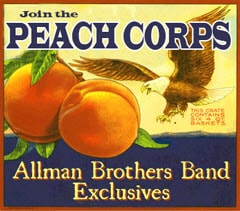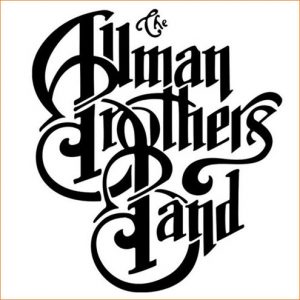Documentary about the Big House will revisit heyday of Allman Brothers Band
By Maggie Large
TELEGRAPH STAFF WRITER
5 February 2006 – Macon Telegraph
Don’t call it an Allman Brothers Band documentary.
“Please Call Home,” the working title for a feature-length documentary film about the Big House, focuses on the band’s Macon roots. But there’s more.
“This is about a family and a home and the community that it took place in,” said Kirk West, executive producer of the film and “tour mystic” for the ABB. “There will be music and there will be old footage. It’ll be people talking from their hearts about that time and about their life.”
The Big House, a three-story, Tudor-style house at 2321 Vineville Ave., was home to the band from 1970 to 1973, a fertile time for them.
“When the band moved here, they were making $1,000 a night,” West said in a June 2005 interview. “When they moved out, they were making $250,000 a night.”
Now West and his wife, Kirsten, live there, and they are in the process of raising money to convert it to a museum. They’ve formed a nonprofit organization, The Big House Foundation, which has raised about $800,000 in the last two years, president Bob Johnson said.
The overall fund-raising goal is $4 million, which will cover purchase of the house, conversion to a museum and future upkeep, he said.
“It’ll be a world-class, state-of-the-art music museum that retains its original home feel,” Johnson said.
The documentary, which has initial production costs of about $150,000, will serve as a fund-raiser for the museum, and it will also help raise Macon’s profile.
“Long-term, it fits in with the grander scheme, which is using the Allman Brothers and the Big House to aggrandize Macon’s musical heritage,” Johnson said.
It was originally intended to be a short film, but it soon blossomed into something larger.
“Early on, there were great interviews,” said Beth Dunwody, a filmmaker with Bright Blue Sky Productions. That led them to expand the project.
“The openness of the people we talked to, the memories it evoked, the connections between people and the community, the music history here – it really got people talking, and we had tape running,” Dunwody said. “This was something larger than we had anticipated.”
It’s also something of a Baby Boomer reclamation of a bygone era, when the young, music-loving hippies took on the Macon establishment.
Filmmaker Elliott Dunwody was a self-described “long-haired hippie kid” in those days who became a sheriff’s deputy before turning to documentary filmmaking.
“Back then, the establishment was very concerned with what was going on,” he said. “Guess what? We are the establishment now.”
Before a roadie interview session in June, West said the Big House needed to claim its rightful place among rock ‘n’ roll shrines.
“There are several houses that were important houses in the history of rock,” he explained. “810 Asbury. Big Pink, which was a split-level ranch house where The Band lived. 461 Ocean Boulevard, where Clapton stayed. Graceland. There are these addresses, these mythic places.”
Many of the interviews were recorded at the Big House itself in a memorabilia-studded room that the band once used for jam sessions. Others took place at the Fox Theatre in Atlanta and at locations in Georgia and Florida.
Simply crossing the threshold of the Big House is enough to jog memories, Elliott Dunwody said.
“It just came back so fast,” he said of his own experience coming back to the house. “All of a sudden, I was just remembering everything.”
On a recent weekday in the north Macon studio of Bright Blue Sky Productions, a handful of people reviewed interview footage. “Mama Louise” Hudson of downtown Macon’s H&H restaurant was up on the big screen, talking about two members of the band’s road crew being “little devils.”
Subsequent clips featured interviews with Chuck Leavell, a Twiggs County tree farmer and keyboard player for the Rolling Stones, West, various associates and Gregg Allman himself.
“The Big House was the hang,” Leavell said in one segment, talking about the house’s place in the hip social scene in early ’70s Macon.
West fact-checked some key dates with the Dunwodys while snippets of his interview played. Then Allman began talking about the baby blue upright piano that he used to write songs such as “Hotlanta” at the Big House.
“The vibe was really good over there. Really good,” Allman said in the footage. “I guess that’s why the songs were so great.”
So far they’ve logged about 32 hours of interviews, archival footage and other material to set the scene. The goal? Boiling it down to one and a half to two hours. The deadline is late spring to early summer.
“We started in June of ’04, and we’ve just done it in spurts,” West said.
Once it’s all put together, the producers will look at a number of options for distributing the documentary. West said music and film festivals are a possibility, as is television, DVD and the Internet. The entire piece has been shot in high definition, so that will allow them to use next-generation DVD technologies, Elliott Dunwody said.
The hope is that the chronicle of life in the Big House will secure it in rock history and underscore Macon’s reputation as the cradle of Southern rock.
The filmmakers realize the band’s history here isn’t all smiles, and that’s OK. After all, while members of the ABB experienced great success in Macon, they also suffered the deaths of founding members Duane Allman and Berry Oakley in separate motorcycle crashes.
“Like everything else in life, there is the darkness and there is the light to it,” Beth Dunwody said.
YOU CAN HELP
Filmmakers working on a documentary about the Big House are looking for old photographs and footage of vintage Macon, particularly from 1965 to 1975, to help add to the feel of the film. Send an e-mail to info@brightbluesky.com or call (478) 471-0077 if you could help.
Copyright (c) 2006 Macon Telegraph. All rights reserved.



